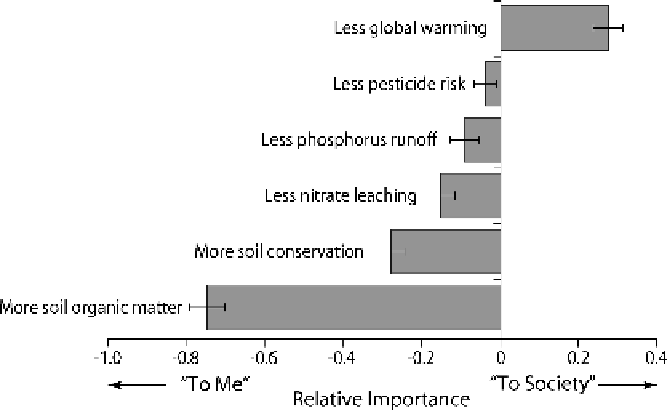Agriculture Reference
In-Depth Information
Figure 2.7
. The relative importance to Michigan farmers and to society (as ranked by the
farmers) of various environmental benefits potentially provided by agriculture. Redrawn
from Robertson et al. (2014).
will strongly influence the farmers' willingness to accept payments for shouldering
a perceived public burden.
The survey revealed that, of a variety of cropping practices known from KBS
and other research to provide environmental benefits, two practices were currently
used by over 80% of the participants (Swinton et al. 2015a, Chapter 3 in this vol-
ume). These included pest scouting prior to insecticide application and reduced
tillage (e.g., chisel plowing). These practices saved labor or inputs or improved
farmstead water quality without reducing expected crop revenue; they were there-
fore desirable with respect to both the environment and farm profitability.
A second group of three practices was viewed favorably by about half of the
farmers: the addition of a small grain, such as wheat, to their standard corn-soy-
bean rotation; incorporating rather than spreading manure; and no-till manage-
ment, at least for specific crop years. In comparison to the first group of practices,
these were perceived to have a greater risk of diminished revenues, higher costs, or
greater labor demands during busy periods.
A third group of practices appealed to less than a third of the farmers: continu-
ous no-till, banded application of fertilizer and pesticides at reduced rates, soil test-
ing for nitrogen prior to nitrogen fertilization, and winter cover crops to substitute
for most fertilizer nitrogen; these practices were seen as particularly high-risk. This
result reveals that, for the rotation tested, although higher average yields (Fig. 2.1)
and comparable profitability (Jolejole 2009) may be apparent under experimental
conditions, they are not by themselves sufficient for the adoption of reduced input
management.
A separate section of the survey elicited what levels of payment (if any) the farmer
respondents would require to adopt environmentally beneficial cropping practices.

